

We have Recently updated our Terms and Conditions. Please read and accept the terms and conditions in order to access the site
Current Version: 1
We have Recently updated our Privacy Policy. Please read and accept the Privacy Policy in order to access the site
Current Version: 1





